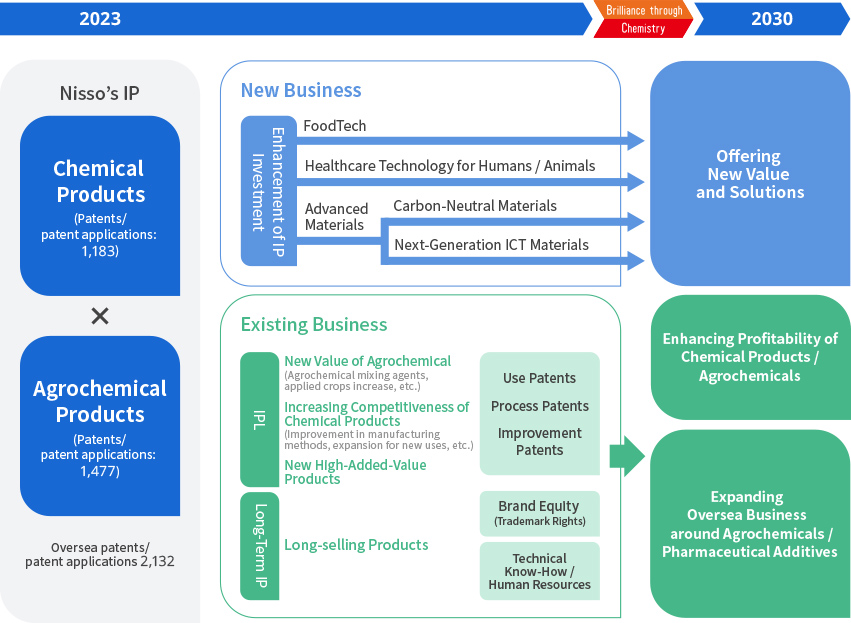Policy on Investment in Intellectual Property
Policy on Investment in Intellectual Property
The Nippon Soda Group (“the Group”) appropriately protects intellectual property, which include technical know-how and sales information as well as patents and trademarks (brands), as they are the basis of the Group’s business continuity and competitiveness.
Basic View
- The Group proactively obtains patent rights for inventions created in R&D activities to protect new products.
- The Group ensures management of our intellectual property including patents / trademarks (brands) / technical know-how / sales information to maintain the competitiveness of the Group’s existing products.
- The Group respects third parties’ intellectual property rights.
Investment in Intellectual Property
The Nippon Soda Group is working on development of new products and creation of new businesses in order to achieve the long-term vision: “Brilliance through Chemistry 2030”. The Group believes intellectual property rights of good quality*1 are indispensable to launch new products, expand the Group’s shares in the market, and break into other fields. For this reason, the Group proactively files patent applications for inventions created in R&D activities to strengthen the Group’s IP portfolio. Nippon Soda CO., LTD. (“Nisso”) holds 2,697 patent rights and applications as of July, 2022, which protect Nisso’s upcoming products and existing products (Figure. 1).
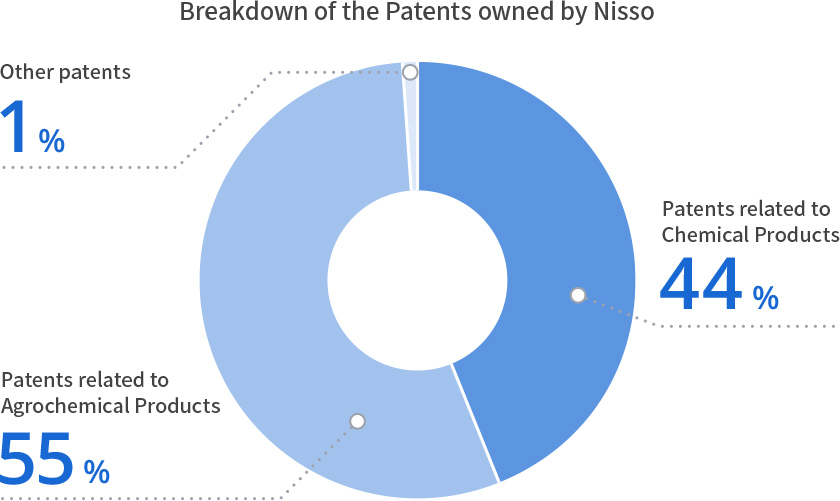
Patents related to Chemical Products: 1,183 (44%)
Patents related to Agrochemical Products: 1,477 (55%)
Figure 1
- *1 How Nisso consider “quality” of their patent rights is disclosed in “ESG data collection 2023.”
Investment in Intellectual Property for Chemical Product Businesses
Nisso owns 1,183 patents inside and outside our country, which are related to chemical product businesses. The breakdown of the patents is as follows: 15% medical product businesses, 33% functional chemical product businesses, 13% environmental chemical product businesses, 39% other businesses/R&D Product-related (Figure 2). Nisso is keen to develop new products while creating an IP portfolio for the R&D products in each business. In addition, for the existing products, Nisso is working on improvements in manufacturing methods and expansion of range of their application to maintain the competitiveness of the products.
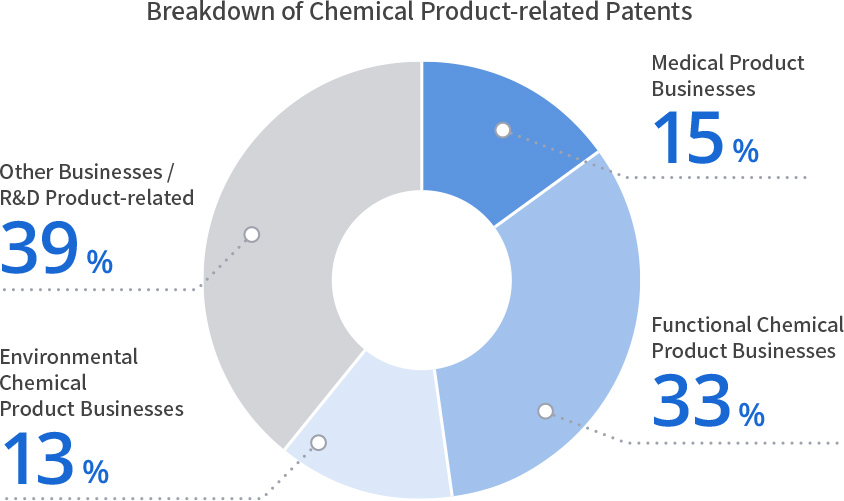
Figure 2
Investment in Intellectual Property for Agrochemical Product Businesses
Nisso owns 1,477 patents inside and outside our country, which are related to agrochemical product businesses (as of July 2022). The breakdown of the patents is as follows: 48% fungicide, 42% insecticide / acaricide, 6% herbicide, and 4% others (Figure 3). These patents protect Nisso’s upcoming products and existing products. The achievements of our R&D in recent years include the start-up of domestic sales of the new fungicide, “PYTHILOCK” in 2017, the new acaricide, “DANYOTE” in 2020, and the new fungicide, “MIGIWA” in 2021. The overseas expansion of these three new products will be planned in the future. In addition, for the other existing products, Nisso is also moving forward with the development of agrochemical mixing agents while expanding the range of their applications to create additional product value of agrochemicals. Currently, Nisso owns a full pipeline for upcoming agrochemical products, and Nisso will continue to create agrochemical products which contribute to food production in the future.
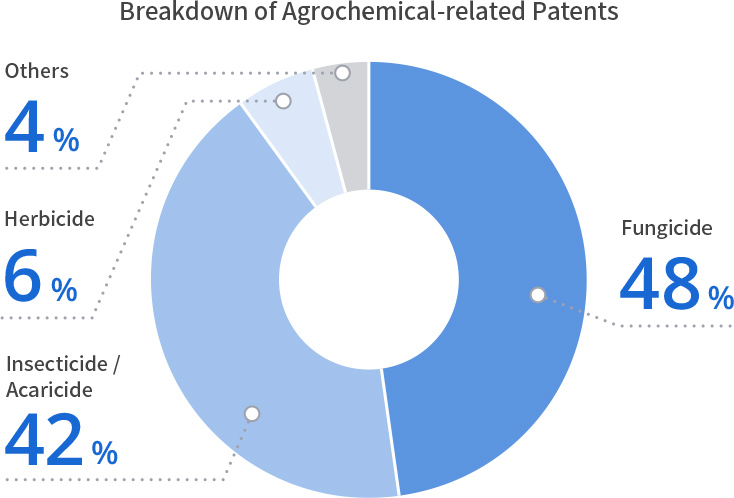
Figure 3
Features of Nisso’s Product Lineups
Nisso has continuously created new products since establishment in 1920. As a result, Nisso’s product lineup today consists of a wide age range of products*2. In general, for a product with an age of 20 years or more, the protections by patent rights are gradually decreasing*3. IP strategy for this issue includes secure management of the related technical know-how and also multiple perspective assessment of the related technologies to create new patent rights especially for improvements. In addition, Nisso is strengthening the brand equity to maintain the competitiveness of the long-selling products. Nisso is also working on investment in human capital to inherit the technical know-how. Stable cash flow is expected to be maintained from these new products and long-selling products.
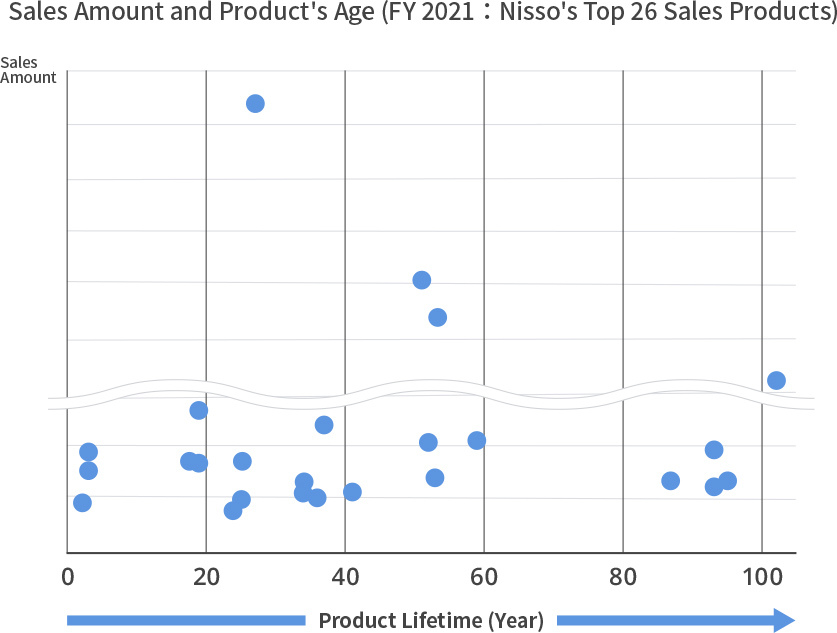
Figure 4
- *2 A product’s age is defined to be the number of years that has passed since the product was launched, while the lifetime of a product with multiple brands is calculated from the fiscal year in which its first brand was launched.
- *3 The duration of a patent right, in principle, expires after a period of 20 years from the filing date of its application. An extension period of 5 years at maximum may be available in some fields.
Intellectual Property Investment in New Business Fields
In addition to the intellectual property investment in the existing fields, Nisso will strengthen intellectual property investment in the three research domains set in the renewed research technology strategy, “Food (FoodTech)”, “Medical Care (Healthcare for People / Animals)”, and “Advanced Materials (Next-Generation ICT Materials / Carbon-Neutral)”. Nisso aims to create a new business among these three research domains. The strategy for new business creation requires various information such as market information and intellectual property information. Nisso’s IP department has deployed a team for monitoring the patent landscape to support new business creation activities through intellectual property information analysis and so forth.
Supervision of Intellectual Property Investment
Nisso’s IP department regularly compiles intellectual property investment reports*4 for the purpose of visualizing the progress in the intellectual property investment. The department reports to the management through these reports and various meetings.
- *4 In-house only
Summary
